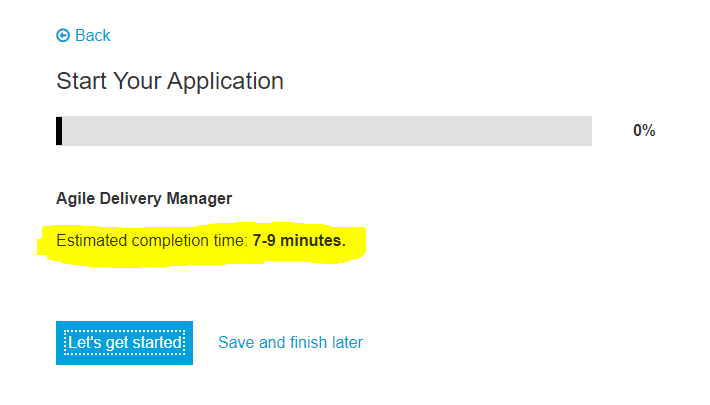The job market is on fire. Not only are we experiencing the Great Resignation, we’re in the middle of The Great Reshuffling, which will result in The Great Consolidation. If you’re serious about keeping your doors open, a “post and pray” recruitment strategy isn’t going to cut it. Want to get people in the door? Here’s four reasons no one is responding to your job posts:
Your Application Process
Every job site allows employers to choose a “quick apply” or “one-click-apply” option. Use it. Being user friendly and mobile-friendly is a must. A huge number of people ONLY have internet access through their phone. Any company that is insisting applicants go to their site, set-up an account, (some with multi-factor authentication! Really?!), and then populate several forms (with mandatory fields like month and date of my degrees and jobs), is likely to have very, very few applicants.
Also, if you’re going to use Quick Apply, use Quick Apply! Employers who embed additional questions into their quick apply aren’t clever, they’re disingenuous, and it makes me not want to work for you.
Finally, there isn’t a single recruiter out there who thinks AI screenings are helping your efforts. There’s a reason people went to college! Read the resumes! Most importantly, focus on what the applicant has to offer, not poking holes into their background and creating a checklist of what they don’t have.
Essay Questions
I know it’s super-easy and awesome to have each applicant write an essay on how they would deal with difficult stakeholders, or describing their last project, or even telling you why they want to work for you (why not all of them?) That way, you can review, discuss and critique each response and each candidate at your leisure — you don’t want waste your precious time calling or emailing anyone. Essays are perfect for you…but here’s the problem: It’s all about you, and it smacks of entitlement. Worse, it tells me that you don’t see writing as work, which it is. To do it thoughtfully and well takes (my) time, which is the same as (my) money.
Essays are perfect for you…but here’s the problem: It’s all about you, and it smacks of entitlement.
Essay questions embedded in ‘quick apply’ options are infuriating because you can’t opt out of the question or skip ahead. So, since I can’t opt-out of the question, I close the browser and opt-out of the application. It’s usually too late, though, because they’ve got my email, and I’ll be hit with a ton of notifications reminding me to complete my application (which I don’t).
Interestingly, you’d think it would be the big enterprises, and the highly-coveted employers who insist on the “tell me why I’m so beautiful” essays. Nope. It’s the small shops and public employers who have the most hoops when it comes to applying, and that’s why no one does.
Your JD Lacks Focus
A lot of JDs are a laundry list of nice-to-have experiences intermingled with tasks and requirements. Many applicants – especially women and “freshers” – disqualify themselves because they don’t meet all the requirements. More experienced applicants, note the confusion and disconnect with reality, and pass on applying.
If your JD is a laundry-list of tasks, requirements, and nice-to-haves thrown together in no particular priority, your lack of focus and thoughtfulness is a BIG red flag to any quality applicant.
A good JD should be no longer than a page. It should clearly describe the core responsibilities, and to whom the position reports. Education, credentials are clearly stated, and requirements are listed in order of priority. The Must have Security Clearance line should be at the top of the list of requirements, not the bottom! Don’t use the “Preferred” section to obfuscate real requirements (Mandarin speaking “preferred” when your entire team is in Hong Kong? Stop already!)
Most importantly, stop looking for unicorns and purple squirrels; you are not the prettiest girl at the dance, and your hubris is counterproductive to building a real team. Whenever you hire anyone, you need to be prepared to compromise and change both yourself and your organization based on the talent available in the market. If you don’t want to change…..
Bad Habits
Why are so many employer’s struggling to hire? The answer: Bad habits. Zero training on how and what to hire. Zero training on how to interview. Toxic managers with high-turnover permitted to hire and fire “at will.” With human resources the most important asset a company can have – in 2021 – how could this be?
First, let’s recognize that for the past 100+ years, employers have never had to compete for labor. Sure, they said they wanted to be “attractive,” but that’s not the same as being competitive. We know lack of competition stifles the invisible hand of the market, and the over-supply of labor verses limited jobs has resulted in a ruling class of corporate executives — America’s Royalty — whose every want and need must be accommodated because they are “job creators.”
Historically, businesses never worried about competing against one another for talent. Now that they must complete, many simply do not know how.
Labor, unlike employers, has been forced to be nimble and adaptable. We’re used to fierce competition, no safety net, and changing direction quickly. Workers have had decades of practice and advice on how to compete for work, how to write good resumes, how to answer questions in interviews, and most importantly, how to be a subordinate and compliant worker. What training do employers have in how to hire people and how to be a good employer? None.
Employers need to act quickly and level-up their hiring game. How? Create hiring committees, dump toxic managers, bottom-up your culture, hire professional recruiters and coaches, finance real retention strategies. Most importantly, understand that your interviewers are brand ambassadors, just like your salespeople. They represent The Company, The Culture, and The Brand. A bad interview experience can damage your brand – permanently – and that is not something you can afford in this highly-competitive labor market.
Final Thoughts
This labor shortage didn’t just happen – it’s been coming for decades – the perfect storm of Covid, bad corporate behavior, retirement/death, and this ubiquitous social media has weakened the stool upon which capitalism has balanced for centuries. Covid’s timing could not be more remarkable. It has jolted our attention to the global economy, our reliance upon technology, the importance of essential workers, and a Kafka-esque understanding that we are more than our labor.
No workers = No customers = No business
If you’re still clinging to the notion that the tight labor market is about lazy millennials or enhanced unemployment benefits, and any minute we’re going to “go back” to the way it was, you’re flat-out wrong. Our world, has fundamentally changed, and if there’s one thing we know about change is that it never changes back!
When it comes to sales, businesses understand competition. That same focus and concern must carry over into resource management. If they can’t compete, just like in sales, they will be out maneuvered by those who can.
###
If you enjoyed this article, check out some my posts and podcasts on employment, interviewing, and the contingent job market. Thanks for reading!
###
Copyright 2021 Pierce/Wharton Research, LLC. All rights reserved. No part of this post shall be reproduced without permission.



Leave a comment